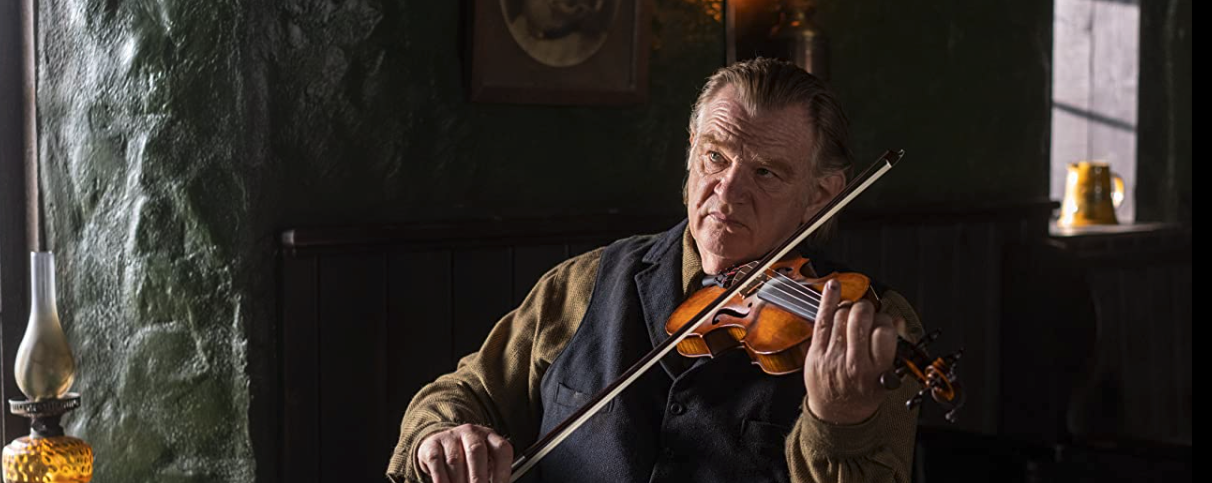
Above: Brendan Gleeson as Colm Doherty in The Banshees of Inisherin.
Met the great Irish musician Paddy Moloney, leader of the legendary Chieftains, years back backstage at Dallas Brooks Hall.
I was with another Irish legend, Melbourne’s Paddy O’Neill, who ushered me past a scowling bull of a security guard with a thumb over his shoulder in my direction and the magical words: “Don’t worry about him, he’s with me.”
By the time the bull figured he was being gulled, we were in, Paddy greeting Paddy alike like long-lost brothers, lots of shoulder-slapping and plenty of beer gushing about the place.
Not sure why I’m reminded of this episode after watching The Banshees of Inisherin. Maybe it’s something to do with Paddy’s fluid control of language, suggestion and meaning.
“Follow me, I’ll be right behind you,” he’d laughingly instruct me. Or gently admonish me with: “I’m sorry, Noel, but you’re wrong again.”
Hold on, when I was wrong before? The Skipper, as he was known, could snooker you before you even knew you were playing.
Which is kind of what happens to Colin Farrell’s Padraig Súilleabháin in Banshees, when his drinking mate, Brendan Gleeson’s Colm Doherty, decides he’s had enough of him and doesn’t want to talk with him anymore. And nothing Padraig does seems capable of changing matters.
No particular reason for all this. Other than Colm thinks Padraig’s “dull” and he wants to spend what’s left of his life focussing on more memorable things, like writing fiddle tunes he hopes will be remembered longer than being “nice” to old mates like Padraig.
With Padraig declaring the first of these new tunes “shite” and refusing to leave him be, Colm ups the ante in a ridiculous fashion I suspect only the Irish could manufacture. He threatens to shear a finger off his fiddling hand each time Padraig talks to him.
Now, I haven’t made it to Ireland yet but I understand it’s a fine country from its Moher Cliffs and Wexford crystal to its Aran Islands, O’Carolan concertos and mad Flann O’Brien ruminations.
Been skirting around its periphery for decades, mind you. Fooling about with its music, soaking up its writings, wrangling with its citizens – which is enormous fun by the way – and observing Hibernian ways with a generally bewildered scrutiny.
Tradition, isolation, religion, history and politics underpin a harshness that’s hard to absorb from a distance. But its sentiment, humour, beauty and logic – fashioned as it is by emotion and humanity – polish those ragged edges.
Banshees brings all of these to the table with its wry plot, damaged characters, ambience and landscape. It tips a cap to Ireland’s brutal history with both everyday and ridiculous violence.
Padraig, gentle innocent that he is, notwithstanding the occasional drunken slip-up, is assailed by deep personal losses – his best friend, his sister’s departure and his tiny donkey when it chokes eating one of Colm’s fingers.
His only recourse is to burn Colm’s house, which Colm accepts as justice for the donkey’s loss. He spares Colm’s dog.
Ridiculous upon ridiculous, it almost looks as if Colm might be willing to rekindle their friendship although Padraig doesn’t seem interested, even if he can’t stop himself from being polite to him.
The Banshees of Inisherin is the name Colm gives his tune-set. It’s a dark, brooding composition which he conducts, blood dripping from his hand, as his students belt it out on their fiddles in the local pub.
Good name for an Irish tune although for mine it’s pipped by another called The Banshee’s Wail Over the Mangle Pit.
Blood-curdling’s probably a fair description. It’s not shite but I think it would sound grand if Paddy Moloney’s Chieftains tackled it. With Paddy O’Neill on the drums, too.
Of course, I could be wrong again …. but I don’t think so.
This article appeared in the Geelong Advertiser 7 February 2023


